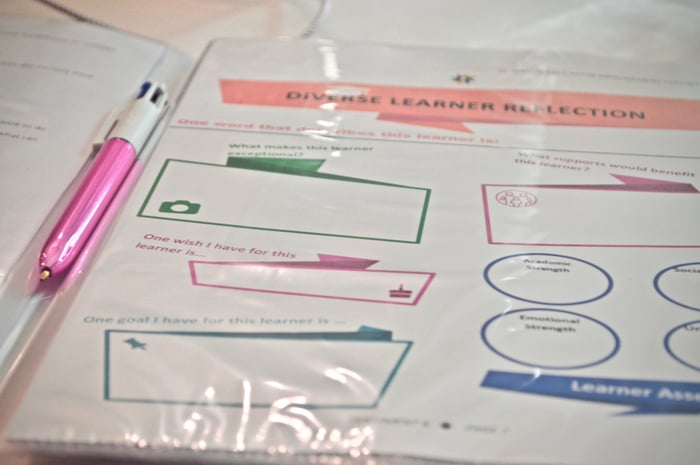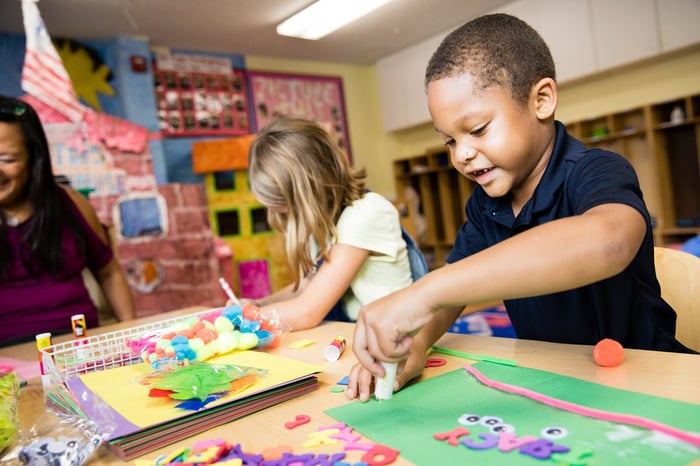Why Start the Ability Challenge?
Article • 5 min read • Dec 11, 2018 11:34:48 AM • Written by: Sarah Sandelius

Lessons from a Founder
As a first-time entrepreneur, I am constantly asking myself big-picture questions: “Why am I doing this? For whom? What does success look like?” It’s not that I’ve never thought about these questions, but to succeed in any big endeavor, it’s crucial to revisit them regularly.
I’ve spent my career weaving in and out of policy, legal, and education jobs, developing expertise in designing strategic operations projects with an eye toward supporting schools’ most diverse learners. I am driven by the stories of children and families. Many have struggled to navigate complicated systems emerging from special education laws and regulations. Others have ended up in correctional settings or dropped out of school because they were unable to tap into the right educational support. One year ago, I wrote an article about how our students with disabilities deserve better than what the adults in the system are giving them. We can all do better. But it’s a lot easier to theorize about what needs to change than to actually change it.
As the founder and CEO of FlipTurn Education Consulting, I work as an advisor to some incredible school and non-profit clients – so why rock the boat? On the other hand, isn’t that the exact moment to not just rock the boat but to capsize it, flip it over, and turn it into a raft? And that’s what I have been doing over the last year, launching a new initiative, The Ability Challenge (or ABC). The name challenges educators and stakeholders to reflect on their own abilities to do more for our most diverse learners, starting with transforming special education.
First came figuring out exactly what it means to “do better,” …which, to a former lawyer like myself, translated into collecting hordes and hordes of information. I spoke to close to 100 stakeholders – parents, teachers, principals, researchers, policy experts, and students with and without disabilities – to ensure I was getting input from all sides. I dug into the market, examining non-profit associations, advocacy groups, ed-tech companies, consulting firms, and other organizations seeking change in the world of diverse learners and in education more generally. I participated in the 4.0 Schools Essentials Fellowship, which gave me the tools and space to conduct a deep root cause analysis and begin testing my assumptions. I conducted a national survey with over 800 responses describing schools’ use of data for special education. I read every article I could get my hands on, and I brought groups of experts together to brainstorm solutions.
As I built a team of advisors, ABC moved from an “I” to a “we.” We are now a movement seeking to redefine success in special education school improvement. We’re looking at three intertwined problems lying beneath the “big rock” of the achievement gap that results in only 65% of students with disabilities graduating on time:
- Pursuit of compliance obscures the real roadblocks to effective support for diverse learners;
- Educators lack a normed and equitable concept for a “successful” program for diverse learners and
- Current tools do not facilitate school-level review of special education programming decisions.







This past November, responding to critical needs raised through my stakeholder conversations, we convened an experienced coalition of educators to build a guiding framework, currently called the Dimensions for Special Education Quality, that puts some stakes in the ground, defining what we’re working toward – what an ideal special education program looks like in practice. By focusing on the real drivers for improvement, schools can move past a compliance culture to one that is created on a strong foundation for equitable student progress.
To make it easier for schools to drive their own improvement initiatives, we’re also developing an application that maps the framework to school-level data. Key indicators are combined into an improvement score and decision tools that will help educators make better, informed decisions that improve student outcomes. The app can be used on its own or in conjunction with other school support initiatives and capacity building to make more informed decisions about programming and resource allocation. In the new year, a handful of partner schools will pilot the app, and we will continue to learn and evolve our model.
In this holiday season, I reflect upon how I can give ABC what it needs in search of what works for students (and metaphorically, turn my “raft” into a speed boat). There have been and will continue to be obstacles, shifts, and bumps as I continue to get my entrepreneurial sea legs, but my commitment to get it right for our students will keep guiding me forwardd
Let's get together and improve diverse learning!
Sarah Sandelius
Our Latest
Related Articles

November 14, 2019 | Data
Want to Connect More with your Diverse Learners?
Find effective strategies to meet the needs of diverse learners, engage them in class assignments, a...

April 9, 2019 | Article
Announcing ABC’s Framework
Discover the Thrive Framework's Vision for High-Quality Programming in Special Education. Learn how ...

October 14, 2020 | 10-minute read
Action-Driven Policy – A Guide for Special Education Leaders
Learn how ABC is building capacity for high-quality special education services and creating a commun...
